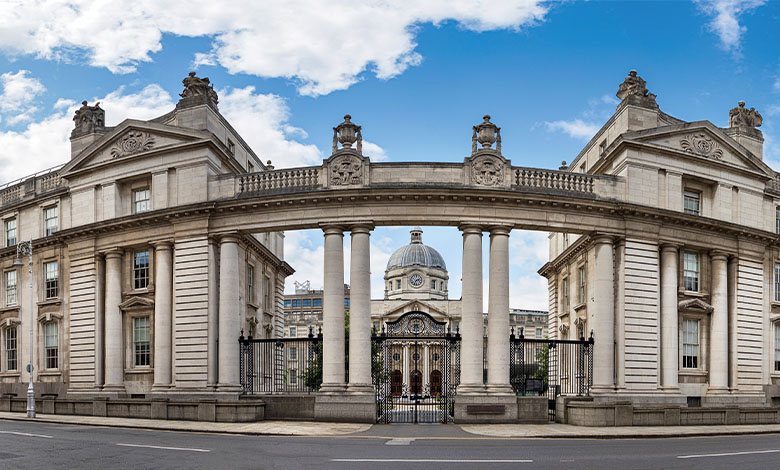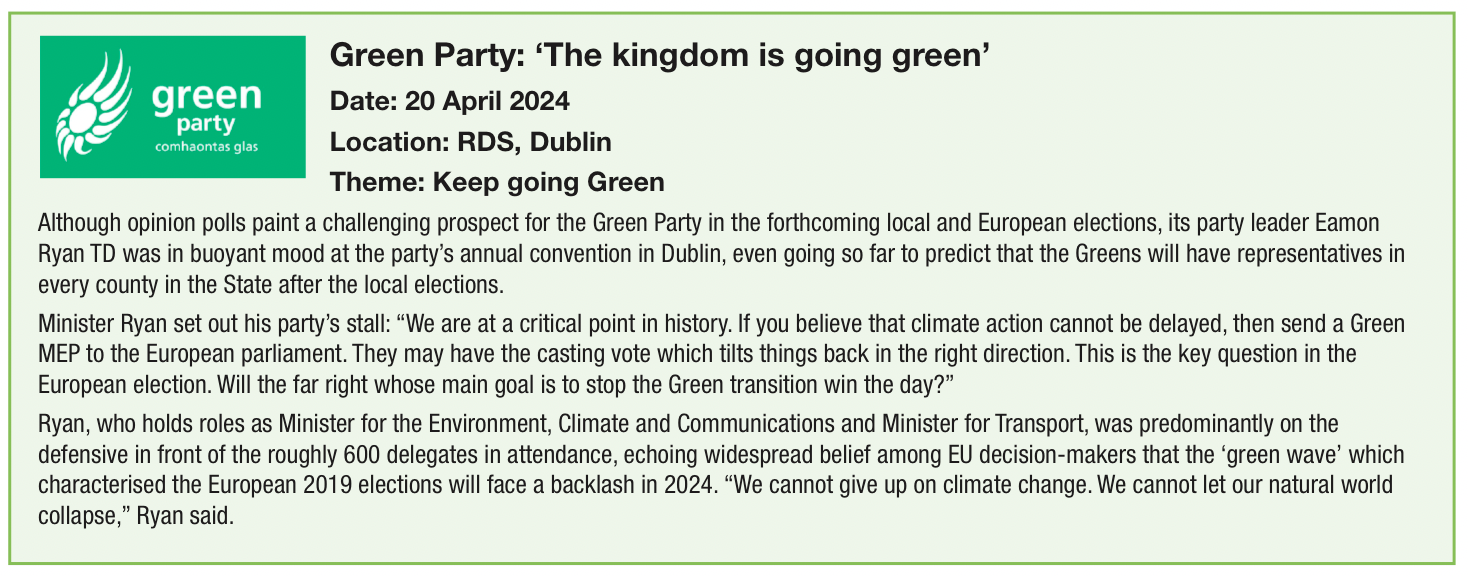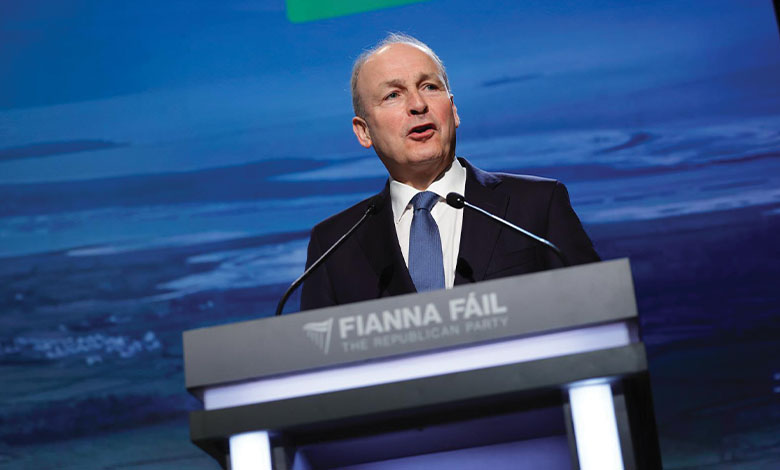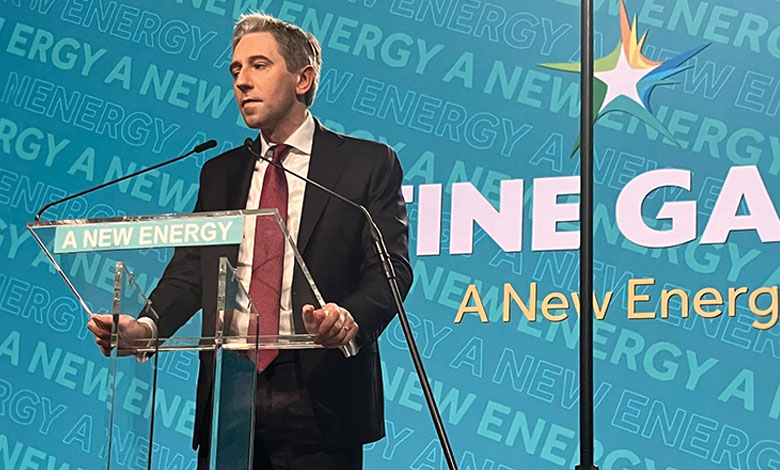Irish politics: Where the parties stand

Ahead of the local and European elections, Fine Gael, Fianna Fáil, the Labour Party, the Social Democrats, and the Green Party have all held their ardfheiseanna and party conferences in the first quarter of 2024. Following their attendance, Ciarán Galway and Joshua Murray reflect on the Irish political landscape.

Fianna Fáil’s search for meaning
Date: 13 April 2024
Location: Dublin Royan Convention Centre
Theme: Delivering for Ireland. Delivering for you.
‘The chief’ is nomenclature which has largely disappeared from Fianna Fáil jargon under Micheál Martin TD’s leadership. Yet, in the most unlikely of circumstances for the once all-conquering party, Martin could follow in the footsteps of predecessors Éamon de Valera and Charlie Haughey as only the third Fianna Fáil leader to lead the party into four general elections.
Ardfheiseanna are typically a rallying cry to the party faithful, however, relative to Fianna Fáil’s two previous gatherings, the 82nd ard fheis was a much more muted affair. In spite of this, Martin’s leadership of the party is secure “for as long as he wants it”, one Fianna Fáil member told eolas Magazine.
Fianna Fáil introduced Martin as the “former and future Taoiseach”, making clear that there are still heady hopes within the party for the man who currently holds the highest approval rating of any political leader in the State.
Martin has come to epitomise modern Fianna Fáil, and he demonstrated his revitalised and apparently unassailable leadership of the party by repeatedly employing the phrase “Fianna Fáil believes…” when outlining his policy priorities. To paraphrase Dev, if Micheál Martin wishes to know what Fianna Fáil wants, he looks into his own heart.
This manifested in often vague platitudes amounting to an unconvincing vision of what Martin’s Fianna Fáil is. “We believe in using economic success to support good pensions and social supports… We believe in helping to reduce costs faced by families… We believe in reaching out to build reconciliation and unity on our island.”
Martin and his colleagues enthusiastically promoted the party’s record in government, with the phrase “Ireland is building again” repeated ad hominem by Minister Darragh O’Brien TD and Barry Andrews MEP.
In spite of leading Fianna Fáil to its three worst general election results in its history, Martin has served in his leadership role for 13 years and managed to assume the office of Taoiseach between 2020 and 2022. Nonetheless, it is worth remembering that when Martin defenestrated Brian Cowen in 2011, his task was arresting the existential decline of Fianna Fáil.
In local elections, Martin’s Fianna Fáil has consistently outperformed expectations by topping the polls in 2014 and 2019 and is hoping to defy the odds for a third time. In European elections, however, his spell as leader failed to stop a trend of decline which began in 1999, having won a single seat (Brian Crowley subsequently lost the Fianna Fáil whip) in 2014, and only winning two seats in 2019.
In their speeches, Fianna Fáil speakers sought to defend their respective records in government, issuing half-hearted political attacks on their closest republican rivals, Sinn Féin. However, sitting among delegates, it was impossible to ignore a palpable flatness, with attempted digs meriting a muted reaction from the Fianna Fáil faithful.
It was a far cry from the 80th Fianna Fáil ard fheis, where Minister Norma Foley TD energised the room with an excoriating attack on Sinn Féin as a “baseless, negative, and spineless” and “the most cynical opposition our country has ever seen”, much to the delight of the delegates.
Although this was a low energy event, there was a small boost in the main hall at the Dublin Convention Centre upon the entry of former Taoiseach Bertie Ahern. As ever when he is pictured among old party colleagues he once led – including former cabinet colleague Micheál Martin – questions of Ahern’s desires on Aras an Uachtarán in 2025 abound.
Instead of feeding speculation, however, Ahern availed of the opportunity to question a fundamental approach being taken by his (having re-joined Fianna Fáil in 2023) party leader, arguing that a general election should be held “this summer [2024]”.
Perhaps responding to the fallout from the 81st ard fheis, Fianna Fáil exhibited some political nous when it refused to extend an invitation to the ard fheis to the Ambassador of Israel to Ireland. Speaking on the ongoing Israeli campaign in Gaza, the Minister for Foreign Affairs Martin stated that, although he continues to condemn the Hamas terrorist attack on 7 October 2023, that Israel’s bombardment of the region “cannot be justified”.
He added: “The evidence shows that war crimes have been committed [by Israel] and the bombardment of the population must be utterly condemned.”
Ultimately, this ard fheis was intended to energise the Fianna Fáil base ahead of the local and European elections, where the party is running for 350 council seats and six seats in the European Parliament.
However, in spite of his best efforts, Martin has still not answered a fundamental question: what does his party stand for? This question is somewhat clearer for his counterparts in Fine Gael and Sinn Féin, both of which have reasonably defined worldviews.
Martin’s repetition of what Fianna Fáil “believes in” shows that there remains a fundamental flaw with the party: it does not have a characteristic ideology in 2024. Micheál Martin is an unconventional leader who has survived longer than most would have predicted, and he can take some satisfaction in ensuring that he did not become the first Fianna Fáil leader to not be Taoiseach – seeing off would-be successors along the way
However, if Fianna Fáil is to thrive in the long term, simply asserting, as it did in the old two-party system, that the party is ‘better at governing’ will not be enough to secure Martin another term as Taoiseach. With the evaporation of the Civil War dichotomy amid the current coalition government, Fianna Fáil’s raison d’être is no longer apparent. As such, its search for meaning will continue as long as it is perceived as less left than Sinn Féin, less fiscally conservative than Fine Gael, and less traditionally republican than both.

Fine Gael: From ‘calm before the storm’ to ‘storm Simon’
Date: 6 April 2024
Location: University of Galway
Theme: A new energy
Leo Varadkar TD will undoubtedly be remembered as one of the most consequential taoisigh in the history of the State, with the North, Brexit, Covid, and failure to solve the housing crisis among the areas which will define his legacy.
Arguably Varadkar’s finest hour as Taoiseach was his “calm before the storm speech” prior to the first lockdown of the Covid-19 pandemic in Ireland, but at the 82nd Fine Gael ard fheis, Varadkar felt very much like yesterday’s man, and the “new energy” revolved around ‘storm Simon’.
The appearance of newly crowned Fine Gael leader, Simon Harris TD livened up what had been a relatively low-energy Fine Gael ard fheis at the University of Galway when he emerged at the top of the stairs above the entrance to the main hall, greeted with raucous cheers by Fine Gael faces, some of whom had returned to the fold.
The Harris leadership’s promise of “a new energy” was the theme of the entire ard fheis, in an apparent response to suggestions that the Fine Gael parliamentary party is experiencing lethargy after three consecutive terms in government. An alternative interpretation is that the party had either been lacking energy or in possession of the wrong energy under Varadkar’s leadership.
Moving swiftly following the announcement of Varadkar’s resignation, Harris was unopposed in his appointment as Fine Gael leader and, three days after the Fine Gael ard fheis, as the 16th Taoiseach.
Disparagingly referred to as the ‘TikTok Taoiseach’ by his opponents, Fine Gael members are hoping that he will be able to preserve Fine Gael as an electoral force in a time of potential flux in Irish politics, with Alan Dillon TD describing Harris’ rise to the top of the party as “storm Simon”.
Harris entered the stage to Backman-Turner Overdrive’s You Ain’t Seen Nothing Yet, in reference to a viral comment made during his announcement that he would seek the leadership of Fine Gael when he stated: “To anyone who thinks this party lacks energy, you ain’t seen nothing yet.”
With some senior Fine Gael members – including Charlie Flanagan TD – publicly suggesting that the party has drifted from its core values under Varadkar, Harris has sought to reassert Fine Gael’s desired stereotype as a party of ‘law and order’, outlining his support for longer prison sentences for knife crime offences, the establishment of a city centre task force in Dublin, and describing the Defence Forces as “the only Óglaigh na hÉireann”, in a thinly veiled attack on Sinn Féin.
Harris also reiterated the Government stance on the Israeli offensive in Gaza, speaking directly to Israeli Prime Minister Benjamin Netanyahu, he said: “Prime Minister Netanyahu, the Irish people could not be clearer. We are repulsed by your actions. Ceasefire now and let the aid flow safely.” These comments received one of the loudest cheers of support of the entire speech, and followed a lively debate earlier in the day where Young Fine Gael had proposed a motion calling on the Government to support the Occupied Territories Bill, with an intervention by Simon Coveney TD on apparent legal technicalities ensuring that the motion failed to pass.
Speaking to delegates after the conclusion of Harris’ speech, there was widespread and genuine enthusiasm for the new leader. One Fine Gael veteran told eolas Magazine: “He is the finest man to take the stage for us since Garrett FitzGerald.”
Nevertheless, anticipation of the next general election is dominating thoughts within Fine Gael. It was repeated throughout the day that the next general election would be “the mother and father of all elections”. Clearly, Sinn Féin’s consistent, though waning, dominance is opinion polls is portrayed as culminating in existential battle at the coming election. This is in spite of the fact that Fine Gael is currently only trailing Sinn Féin by 5 per cent in opinion polling and is likely to gain seats in the next Dáil based on current projections.
Fine Gael’s long-term strategy may well be to reorientate Ireland’s political system into a conventional left-right, two-party system akin to other European states, with itself as the centre-right option in opposition to Sinn Féin as the centre-left option.
Sinn Féin was the main recipient of ire from many of Fine Gael’s leading figures, with PENDR Minister Paschal Donohoe TD saying that “at the heart of Sinn Féin” there is “a dangerous void”.
Continuing this theme ahead of the leader’s speech was ard fheis chair Jennifer Carroll MacNeill TD, a Minister of State who – delegates were informed – attended her first Fine Gael ard fheis at the age of four.
Introduced to delegates as “a formidable force who is not afraid to take on the opposition”, Carroll MacNeill launched an attack on Sinn Féin that left no perceived critique unspoken, going as far as to describe the specific convictions of former members, while referencing others who had appeared before the Special Criminal Court, and jibing that “they might sue me like they sue the journalists in this State”.
The overall impression from this ard fheis is that – unless it renegotiates a programme for government with Fianna Fáil for an unprecedented fourth successive term in government – Fine Gael is preparing for a spell of convalescence in opposition. Depending on when an election is called, it is possible that Simon Harris becomes the shortest serving Taoiseach in the history of the State.
While the fact that one-third of the party’s TDs are resigning at the next election has been maligned by much of the media and political rivals, in the eyes of the new party leader, this will present Harris an opportunity to stamp his authority over a fresh crop of TDs and lead a party which can either win a fourth term in government (the first time this would happen since Éamon de Valera), or effectively lead the opposition in the next Dáil.










